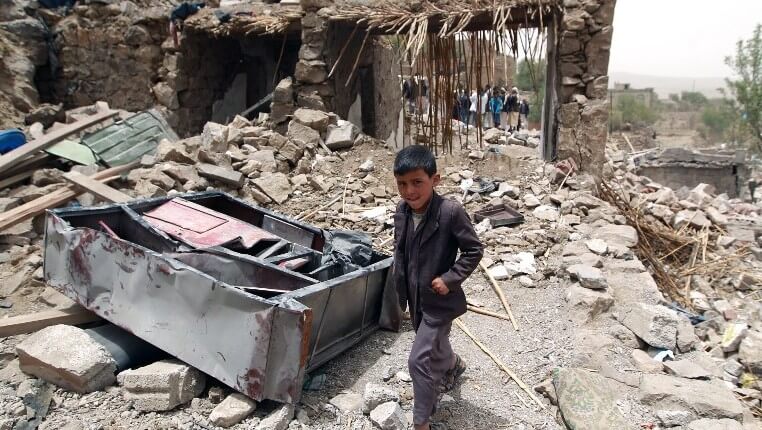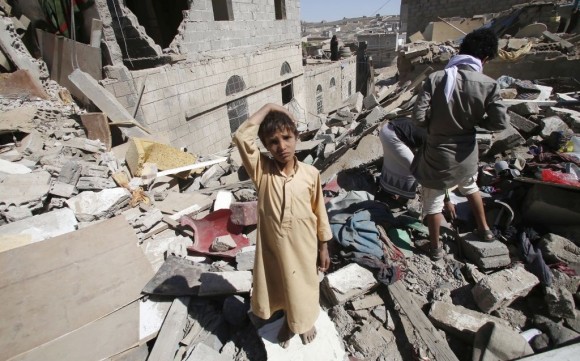21 million people in Yemen are in need of humanitarian aid, but the world is largely ignoring it, an officer for international human rights organization Save the Children warns in an op-ed in the Guardian.
There are around 26.7 million people in Yemen, according to the World Factbook. This means approximately four-fifths of Yemenis are in need of humanitarian aid.
The Saudi-led, US-backed “war has left Yemen, already the poorest country in the region, mired in a humanitarian crisis,” writes Mark Kaye, humanitarian advocacy and communications manager for the NGO.
Violence has spread to 20 of Yemen’s 22 provinces, creating what the UN and human rights organizations call a “humanitarian catastrophe.”
The US has steadfastly supported the Saudi-led war in Yemen, in spite of numerous human rights organizations accusing the coalition of committing war crimes. In an April article warning the sale of US weapons “fuels the wars of Arab states,” the New York Times contextualized the fighting in Yemen as part of the region-wide proxy war where “Israel and the Arab states are now in a de facto alliance against Iran.” Although Israel has been nearly silent on Yemen it is clear the country’s sympathies lie with its allies in the US-backed coalition of Middle Eastern nations and forces loyal to President Abd Rabbuh Mansur Hadi, who are fighting Iran-backed Houthi rebels and fighters loyal to former President Ali Abdullah Saleh.
UNICEF estimates around 400 children have been killed and 600 more injured so far in the conflict. And if “we don’t act soon, thousands of children will die from hunger-related causes before the year is out,” Save the Children warns.
Kaye states “Yemen is slowly being strangled by a de facto [Saudi] blockade that prevents enough food and medicine getting to the families who need them most.”

Photo: AFP / Mohammed Huwais
The siege was imposed just days after the Saudi-led coalition began bombing Yemen on March 26, with weapons provided by the US, including banned cluster munitions.
Saudi Arabia defends the blockade much in the same way Israel justifies its illegal eight-year siege on Gaza, claiming it is being done to prevent weapons and ammunition from being sent to the Houthi rebels.
As Mondoweiss has reported before:
90% of Yemen’s food is imported, yet Saudi Arabia’s stringent air, water, and land blockade, in the name of preventing weapons from entering the war-torn country, has prevented not just food, but also fuel, medicine, and urgently needed aid from getting to the millions in need.
Even journalists have been denied entry by Saudi forces. The Nation foreign correspondent Matthieu Aikins explained he had to smuggle his crew in by boat from neighboring Djibouti.
In July, the head of aid group Doctors Without Borders told AFP that the blockade is “killing as [many people as] the current conflict.”
Aid and human rights organizations were already warning as early as the beginning of June that 20 million Yemenis were facing humanitarian disaster, in urgent need of food, water, and medicine. Three months later, these dire needs still persist.
According to the UN, 4,500 people have been killed in Yemen since the war broke out in March. In over 150 days of bombing, an average of 30 people have been killed per day in Yemen.
On August 30, a Saudi-led airstrike killed 36 civilians who were working at a bottling plant in northern Yemen.
Civilians have been particularly impacted by the violence. Human Rights Watch (HRW) found banned US-made cluster munition rockets used in numerous attacks on Yemeni civilians. “Cluster munitions are, by definition, indiscriminate,” HRW Executive Director Kenneth Roth told Democracy Now. “They scatter over wide areas, so they should never be used in civilian-populated areas to begin with.”
Roth says Saudi Arabia is “repeatedly using indiscriminate forms of warfare” in Yemen, and maintains that “there’s not so much concern about civilians.” The Saudi government is “a major supporter of the US military complex,” he adds.
Meanwhile, as 21 million Yemenis, roughly 80% of the population, are in need of humanitarian aid, extremist groups including al-Qaeda and ISIS are taking advantage of the chaos and seizing new territory.



Ben important piece. Have been going over to another stellar website “The Intercept” to read about the situation in Yemen. Not much coverage of this issue anywhere else that I have found. Not even counting numbers killed. Not much access.
While this situation with Iran is looking constructive. U.S. support for rebels in Syria has resulted in hundreds of thousands dead, over a million refugees. Our support for SA in Yemen is doing the same.
Thanks for this report
RE: “Roth says Saudi Arabia is ‘repeatedly using indiscriminate forms of warfare’ in Yemen, and maintains that ‘there’s not so much concern about civilians’. ” ~ Ben Norton
MY COMMENT: Apparently the Saudi “Royal Family” is not satisfied with all the blood their proxies/mercenaries are spilling in Syria. How many hundreds of thousands (or millions) must die in order to satiate Saudi Arabia’s blood lust?!?!
P.S. Let your women drive (and leave their houses unescorted by a male), Saudis! ! !
Yemen’s army, Ansarullah and the resistance fight back against the Saudi-led invasion of Yemen, and that more and more effective. When the Saudi-led coalition invaded Yemen, Abdul Malek Al-Houthi said they entered a swamp. Now the swamp pulls the invaders down:
It looks like the Saudi-led coalition just makes some of the nightmarish experiences the US has already made after it invaded Afghanistan and Iraq.
4 comments. Telling and very sad. Somehow the value of the lives of people being in murdered does not even add up to 4 comments here at MW.
Back in the day, during the Vietnam War, we knew we lived in the belly of the beast. That is still true. The U.S. sets up the conditions for tragedy, and then we sit and watch the suffering on t.v.
From “Regime Change Refugees: On the Shores of Europe,” http://www.counterpunch.org/2015/09/04/regime-change-refugees-on-the-shores-of-europe/ .
The entire article, “Regime Change Refugees: On the Shores of Europe,” is well worth reading, and the cartoon that illustrates it is unforgettable.